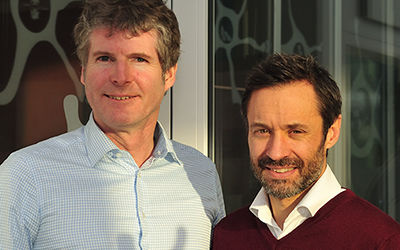Researchers use maths to find keys to long Covid

Researchers from KTH and the Karolinska Institute at the MedTechLabs Centre for Medical Technology Research now aim to determine why certain people with Covid suffer long-term effects.
“By using advanced mathematics and data analysis, we hope to be able to find the reason why the illness develops like this, in order to contribute to better diagnosis and treatment,” says Henrik Hult, Professor in Mathematical Statistics at KTH.
Extreme chronic fatigue, brain fog, high pulse rate, nausea, dizziness and fainting. These are a few typical symptoms of POTS (Postural orthostatic tachycardia syndrome) that is common in long Covid patients, and that are now being investigated in a new research project at .
“Applying mathematical analysis of complex patient data and measuring communication between the body and brain can provide unexpected and valuable insights,” says Henrik Hult.
He is leading the research project together with Peder Olofsson, a Docent and Researcher in experimental medicine at the Karolinska Institute.
“We hope to be able to find a connection that explains why long Covid arises. For example, we want to see if symptoms such as POTS can be connected with the presence of the HMGB-1 molecule,” Hult further explains.
This molecule can be one of the causes of the inflammation that arises when Covid-19 sometimes attacks the autonomic nervous system. The researchers view the possible molecular connection as particularly interesting, as a specific therapy targeting HMGB-1 is being developed.

The planned study will build on early studies by the researchers into:
1. how nerve reflexes affect immune defence and inflammatory conditions, and
2. how electrical stimulation of specific nerve signals can become a pioneering future treatment method.
Several projects are in progress internationally that aim to perform complex analyses of patient data successfully, but to date only a few have had any success.
According to Hult, researchers in Sweden have unique opportunities for data analysis, as the course of the illness here can be monitored over an extended period, even after patients have been discharged from hospital – as patient data can be linked to patient civil registration numbers.
Biological material from 500 patients
The MedTechLabs research group is working closely with healthcare providers at Karolinska University Hospital, where extensive data and biological material have already been collated from over 500 patients.
The study has received financial support from the Stockholm Pandemic Resilience Foundation. If further finance is granted in the next couple of months, the researchers expect to be able to reach findings that can be applied already this year.
“Even if our hypothesis proves not to be correct, we are making progress in knowledge about the illness via our research.”
Katarina Ahlfort
Photo: Unsplash
